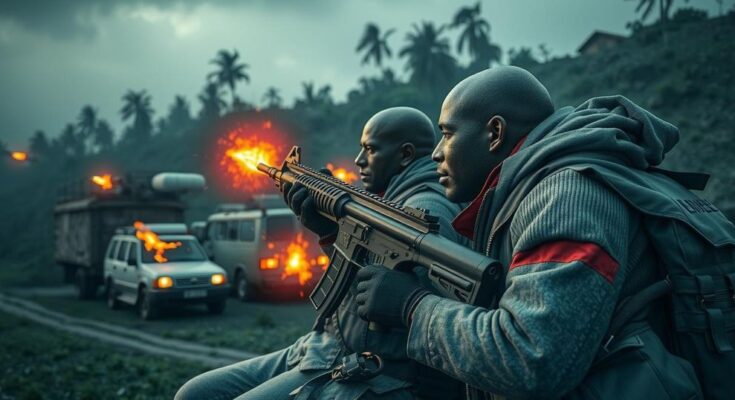Rebels from the M23 group have captured two vital towns, Katale and Masisi, in eastern Congo, exacerbating a severe humanitarian crisis that has displaced millions. The region, fraught with conflict, sees claims of foreign support for the M23, complicating the search for peace amid allegations of government negligence. Local leaders express alarm over increased violence and the dire conditions faced by civilians.
Recent reports indicate that rebel forces, specifically the M23 group, have successfully captured two significant towns in eastern Congo, namely Katale and Masisi. These developments have escalated an already dire security and humanitarian situation in the region. Located approximately 49 miles from Goma, Masisi serves as a strategic entry point into the country’s interior, and its fall marks a critical shift in territorial control amidst ongoing conflict between various armed factions.
The M23 group, which has emerged as one of over 100 armed groups operating in the mineral-rich eastern Congo, took control of these towns within the past week, exacerbating the humanitarian crisis that has led to the displacement of over 7 million people. M23 political representative Lawrence Kanyuka announced this development via social media, emphasizing the group’s purported commitment to civilian protection.
Alexis Bahunga, deputy for the Masisi territory, confirmed the town’s capture by the M23 group, highlighting the catastrophic humanitarian conditions. “The humanitarian situation is so catastrophic,” Bahunga remarked, noting that many people have been forced to flee to various camps throughout the area. Residents in nearby villages are experiencing severe distress, as testimonies indicate ongoing violence, including civilian casualties from rebel attacks.
Congolese military spokesperson Col. Djike Kaiko stated he was in the process of verifying claims regarding the recent developments. Civilian leaders, including John Banyene of the Forces Vives du Nord-Kivu, have publicly condemned the government’s slow response to the advancing rebels, calling it unacceptable under the circumstances.
Moreover, allegations persist that the Rwandan government is providing support to the M23 group, a claim Rwanda disputes. In February, Rwanda admitted to deploying troops in eastern Congo for security reasons, indicating a complex regional conflict. Despite a ceasefire agreement reached in July, hostilities have reignited, raising concerns from the United States regarding ongoing violations.
In summary, the capture of these towns by the M23 rebels not only highlights the ongoing instability in eastern Congo but also underscores the urgent humanitarian needs of displaced populations, amidst claims of foreign intervention in the conflict.
The eastern region of the Democratic Republic of the Congo (DRC) has been a focal point of instability due to the presence of multiple armed groups vying for control over the area, which is rich in natural resources such as minerals. The M23 group, formed in 2012 and active in the region, has been involved in ongoing conflicts against the Congolese government and rival militias. The humanitarian situation is grave, with millions displaced due to violence, making it one of the world’s most pressing crises. International organizations, including the United Nations, have expressed concern over regional security dynamics and the humanitarian impact of the conflict. The situation is further complicated by allegations of external support for various factions, notably involving Rwanda, which has prompted international scrutiny and responses.
The seizure of Katale and Masisi by the M23 rebels represents a significant escalation of violence in eastern Congo, deepening both security and humanitarian crises in the region. The rapid deterioration of conditions for local populations raises severe concerns for international observers and humanitarian organizations. The ongoing allegations of foreign involvement, particularly from Rwanda, complicate diplomatic efforts to restore stability and peace. In light of these events, a concerted effort is essential to address the underlying issues contributing to the conflict and support the affected civilian population.
Original Source: triblive.com




